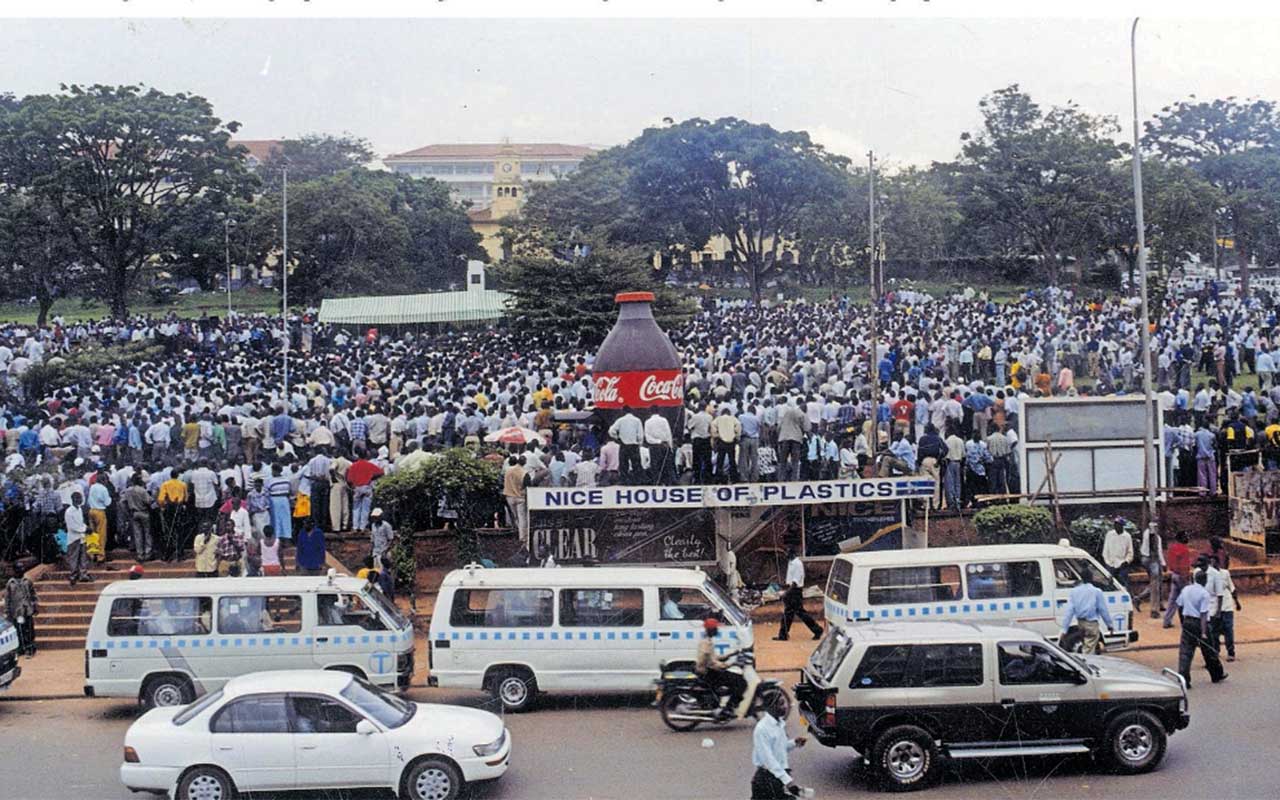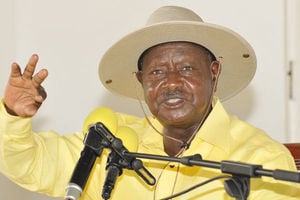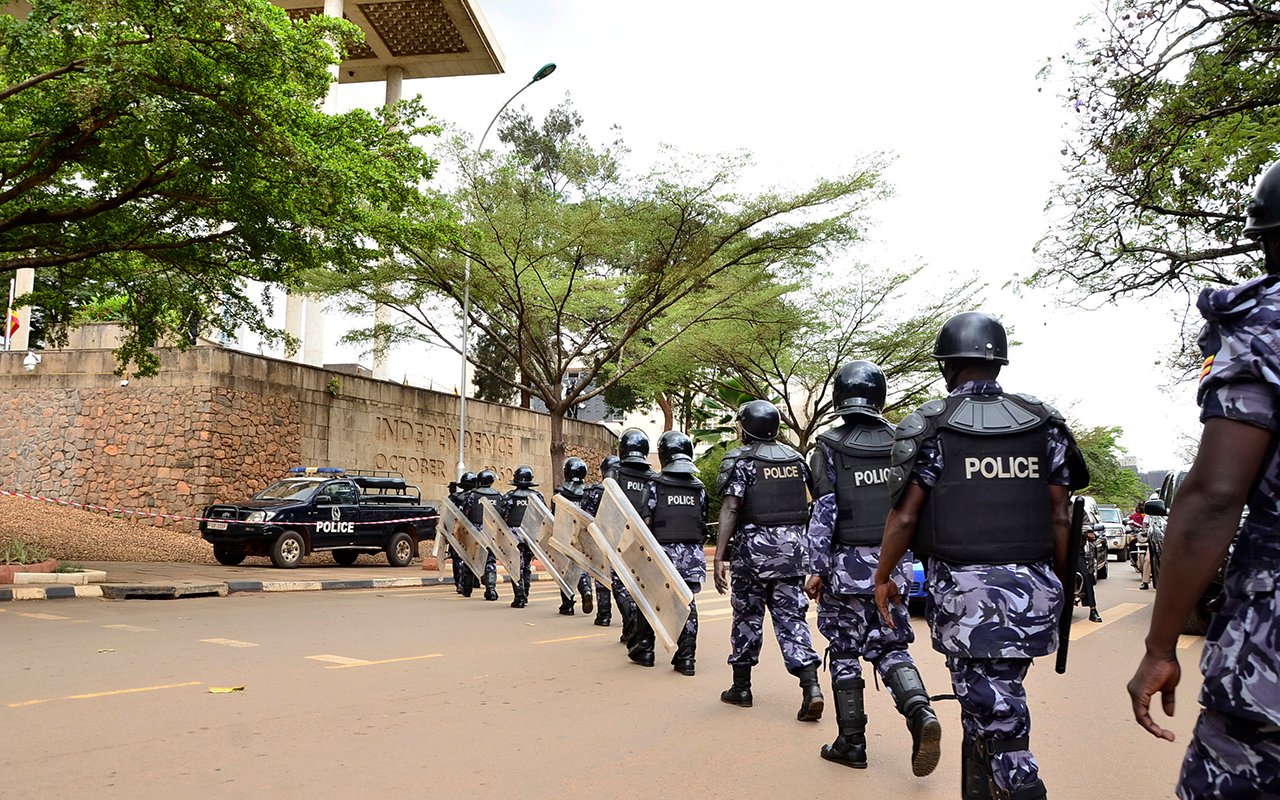
A crowd at a DP rally at the Constitutional Square in Kampala in the 2000s. It was renamed at the launch of the 1995 Constitution 29 years ago. PHOTO/FILE
Twenty nine years ago on Tuesday, the 1995 Constitution was promulgated at the City Square, which was on the same day renamed Constitutional Square, in Kampala.
Mr Meles Zenawi, the prime minister of the Federal Republic of Ethiopia, was the guest of honour. Zenawi died on August 21, 2012, at the age of 57.
The process of making the 1995 Constitution commenced in 1988 with the appointment of a Constitutional Review Commission chaired by Justice Benjamin Odoki.
The Commission carried out surveys and nationwide consultations that formed the basis of the draft that was presented to the Constituent Assembly to debate even though some of the proposals, such as a federalist form of government, which was supported by 65 percent of Ugandans, including 95 percent of the people of Buganda, was later ignored.
That was followed by a debate in the National Resistance Council (NRC) on the Constituent Assembly Statute of 1993, which paved the way for the March 1994 Constituent Assembly (CA) elections that led to the election of delegates to the assembly and months of debate.
The launch
The promulgation procedure involved a five-minute recital of a Statutory Instrument that the chairman of the CA, Mr James Wapakhabulo, said was about to “change the constitutional order of Uganda”.
Wapakhabulo, who went on to become Speaker of the Sixth Parliament before being appointed national political commissar and minister of Foreign Affairs, died on March 27, 2004.
The Monitor newspaper edition of October 9, 1995, captured the mood of the moment.
“The Hall erupted in a din of ululation and clapping as the delegates and NRC members congratulated themselves,” the newspaper reported.
It should, however, be noted that leaders of the Opposition political parties such as the president general of the Democratic Party (DP), Paul Ssemogerere, Adoko Nekyon (DP), Uganda Peoples Congress (UPC) strong persons Cecilia Ogwal, Adonia Teberondwa, Dick Nyai and other proponents of multiparty democracy, who had been delegates to the assembly and had tried to fight for a quick return to multiparty democracy, skipped the ceremony prompting President Museveni to throw a jibe at them.
“I hear multi-partyists are in mourning, but for me, I have nothing but jubilation,” Mr Museveni was quoted to have told the gathering.
The proponents of multiparty politics had worked together in the CA under what was known as the National Caucus for Democracy (NCD).
NCD, whose secretary general was the late Prof Dani Wadada Nabudere, was also opposed to proposals to use periodic referenda as a means through which political systems could be changed.
As part of the procedures, three red copies of the new Constitution were presented to President Museveni who kept one for the Executive before handing a copy to the chairperson of the NRC, Moses Kigongo, who represented the Legislative arm of government, and the Deputy Chief Justice, Justice JC Manyindo, who was represented the Judiciary.
Museveni’s unhappiness
Despite having earlier declared that he was in a jubilatory mood, Mr Museveni was quick to point out that he was not happy with articles 26 and 237 of the new Constitution, saying they would turn out to be impediments to his efforts to industrialise Uganda as they made it compulsory acquisition of land by the government practically impossible.
“I don’t believe in okuzagira (being stagnant). I believe in moving forward, and so a solution must be found to have land for industrialisation of the country,” Mr Museveni said.
The Constitution, he said, should have made it much easier for the government to acquire land to give to investors.
“The central government must find it easy to buy big chunks of land to give to industrialists, and if necessary buy this land compulsorily,” Mr Museveni said.
Exchange with delegates
Seemingly not satisfied that he was not getting responses to some of his concerns in regard to land acquisition, Mr Museveni then turned to a section of the delegates, who however insisted that the government should be in a position to buy land just like any other party that would be interested in acquiring it.
“The last time I heard of this talk of buying, was that there must be a willing buyer and willing seller, but supposing you do not get a willing seller?” Museveni asked irritably.
The Monitor newspaper of October 10, 1995, reported that the delegates shot back saying the position could not change.
“Anyway, I think it’s a serious omission. I am disappointed that you did not address this crucial provision,” Museveni was reported to have said.
Supporting the document
Despite having voiced those concerns, Mr Museveni was quick to describe the 1995 Constitution as one that “We (Ugandans) must enthusiastically welcome. It is a political entandikwa”.
The President said he was at least satisfied that the Constitution is amendable.
“From now on, anybody who wants to change it will have to work politically to do so,” the President said.
Amendments
The Constitution has, indeed, been amended on at least seven occasions, the most significant of which include the Constitutional Amendment Act 2017, which led to the amendment of articles 61, 77, 104, 105, 181 and 185; the replacement of articles 102, 289 and 291; and the insertion of a new article, 289 (A).
The sum total of those was the removal of the upper and lower age limits for the President and requires the Electoral Commission to organise general elections in the first 30 days of the last 120 days before the expiry of the term of office of the President, Parliament or local government. It also extended the terms of office for the President, MPs and Local Councils from five to seven years, a decision which was quashed by the Constitutional Court.
Other significant amendments are Constitutional (Amendment) Act, 2015, Act No.12 of 2015, which allowed for defection of MPs from one party to another at least 12 months before the expiry of a term of Parliament and Constitution (Amendment) (No.2) Act, 2005, Act No.21 of 2005, which led to the creation of Kampala Capital City Authority (KCCA); Constitutional (Amendment) Act, 2005, Act No.11 of 2005, which led to, among others, the removal of presidential term limits.
Bashing Obote
The promulgation that started with Mr Museveni laying a foundation stone on the constitutional monument at Constitution Square and ended with dinner at the Nile Hotel Gardens, however, could not have ended without Mr Museveni bashing the late former president Apollo Milton Obote who was living in exile in Zambia.
Obote died on October 10, 2005, of kidney failure in a hospital in Johannesburg, South Africa, at the age of 80.
Mr Museveni who claimed that the 1962 Constitutional process had backfired because of the lack of a middle class and sectarian ideology, lashed out at Obote, accusing him of having disenfranchised the citizenry.
“Obote disenfranchised the people of Uganda, overcentralised powers and abolished the traditional institutions,” he said.
He added that while he would never, for instance, “fall down and stand up again,” before a three-year-old boy who happens to be a king, “these people do it not for the boy, but for themselves; it’s their identity, their pride”.
At the time, three-and-a-half-year-old Kingo Oyo Nyimba Kabamba Iguru Rukidi IV, had just ascended the throne to become the 12th Omukama of Tooro, succeeding his father, King Patrick David Mathew Kaboyo Olimi III.
Mr Museveni said the new Constitution restored the pride of those who believed in cultural institutions and right the wrongs that were instigated by Obote and Amin.
Against parties
Museveni, who ended his speech by declaring October 8, Constitution Day, also took time off to defend his opposition to a quick return to multiparty politics on grounds that the “social configuration” of the country was not conducive for multiparty politics. He said he would never tire of arguing so.




